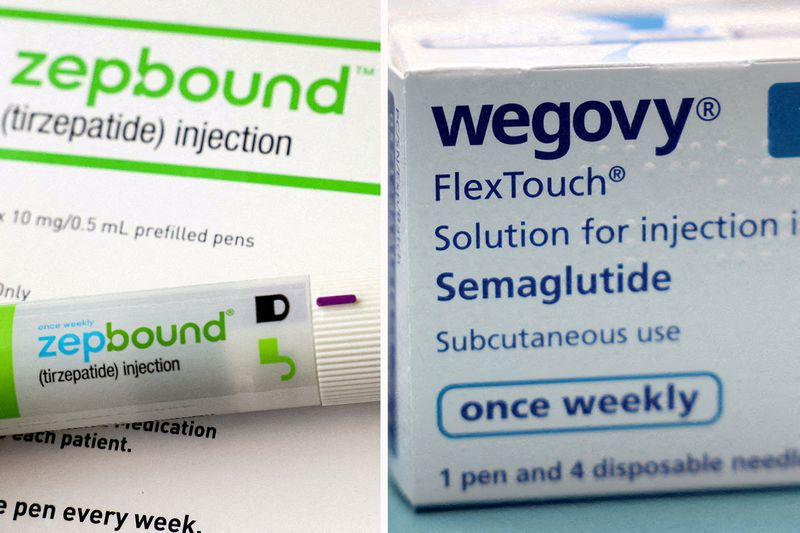By Maggie Fick and Patrick Wingrove
LONDON/NEW YORK (Reuters) - As Eli Lilly (NYSE:LLY)'s weight-loss drug Zepbound gains ground in the U.S. against Novo Nordisk (NYSE:NVO)'s Wegovy, some doctors say their guiding principle for writing prescriptions is simple: which drug can my patients actually get at the pharmacy?
Lilly has quickly built a roughly 40% market share in the U.S. since it launched Zepbound in December, hitting 130,000 prescriptions for the week ending July 19, compared to 200,000 for Wegovy, according to IQVIA data published in analyst notes.
Data from separate clinical trials showed Zepbound leads to slightly higher weight loss on average than Wegovy, prompting some patients to seek the Lilly treatment. But both companies have been unable to produce enough of the medicines, taken weekly by injection, to meet unprecedented demand.
"The reality we live in right now is that we are beholden to these supply issues," said Dr. Eduardo Grunvald, an obesity medicine physician at University of California, San Diego.
Five U.S. doctors specializing in obesity told Reuters they prescribe whichever of the two drugs is more likely to be available at the time, even if that means a patient has to switch between them, to ensure continued treatment.
Investors will be focused on supply updates from Novo and Lilly when the two companies report quarterly results this week.
“While we will do our best to support those who want to start taking Wegovy, it is important to recognize that overall demand will continue to exceed supply and some patients may still have difficulty filling Wegovy prescriptions,” Novo said in an update on its website.
Lilly's CEO last week said the shortage of its weight-loss drug would end "very soon". On Friday, the U.S. Food and Drug Administration updated its website to say Zepbound was available but the agency did not remove the drug from its shortage list. It said in a statement it was working with the company to confirm that supplies were stable.
Some analysts have forecast the market for new weight-loss drugs could reach $150 billion annually by the early 2030s.
Both companies have announced plans to spend billions of dollars to boost manufacturing by expanding factories, building or buying new ones and seeking more deals with contract drug manufacturers.
They are also launching the treatments in new countries, including Britain, Germany, Saudi Arabia and the United Arab Emirates for Lilly, and Australia, Canada and Spain for Novo. But the U.S. market, where more than 70% of adults are obese or overweight, is the most lucrative by far.
50-50 SPLIT
"For both companies the real driver of results right now is a supply question rather than a demand one," said Nicholas Anderson, Managing Director at Thornburg Investment Management, a Novo Nordisk shareholder.
The lowest three out of five dose strengths of Wegovy are still in shortage, according to the FDA website.
Since the beginning of this year's second quarter, the Danish drugmaker has filled an average of nearly 170,000 U.S. Wegovy prescriptions per week. Indianapolis-based Lilly has filled an average of just under 100,000, according to weeks of IQVIA data reported by analysts.
Five analysts told Reuters the companies will likely split the U.S. market roughly 50-50 by the end of 2024, as Lilly increases its manufacturing capacity and continues to close the gap with Novo.
These analysts said the even split would continue until supply stopped being an issue, at which point greater demand for Zepbound could give Eli Lilly an edge.
The market landscape also would change if companies can introduce more effective or convenient versions of these weight-loss drugs, such as a pill that works as well as injections, they said.

In the meantime, some patients have expressed a preference for Zepbound, having read online that it can be more effective, said Dr. Robert Kushner of Northwestern (NASDAQ:NWE) University's Feinberg School of Medicine in Chicago who received $35,300 in fees from Novo Nordisk and $2,500 from Eli Lilly in 2023, according to the Open Payments database on industry payments to U.S. doctors.
"That info is starting to get out," he said of potentially greater weight loss with Zepbound. "But when I talk to them and explain the supply constraints for both medicines, they quickly realize it depends on what they can get their hands on and that it won’t be possible to shop around."